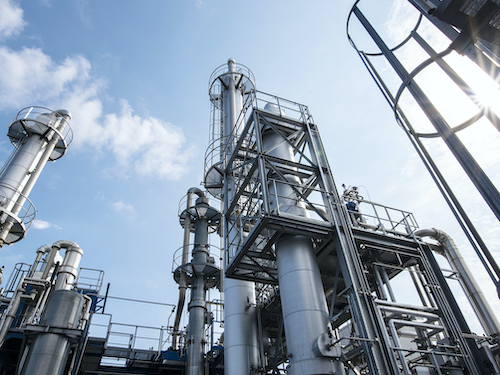
Richard Geiss
In the project different approaches to waste heat utilisation were analysed technically and economically. Waste heat sources and sinks were compared and concepts were developed, for which the funding possibilities according to the "Bundesförderung für Energieeffizienz in der Wirtschaft" EEW (BAFA) were researched.
Richard Geiss GmbH is a third-generation family-owned company that offers transport, disposal and processing of waste with organic solvents from various industries. The core process is the professional preparation and distillation of the solvents from the waste and the return of the high-purity distillates into a functioning circulation system.
Key data on the project
Richard Geiss GmbH
The field of expertise is the takeover and processing of solvent-containing waste products as well as the sale of high-purity distillates.
At the site, solvents are evaporated from the residual materials with the help of thermal oil, condensed via cooling water and thus distilled in pure form. Some of the residual substances produced in the process are transported away for disposal and some are used in a rotary kiln to generate steam on site.
Industry sector
Chemical industry
Project location
Offingen/Donau
Target group
Small and medium-sized enterprises
Keywords
Waste heat utilisation, process optimisation, absorption refrigeration, funding, funding programme "Energy consulting in medium-sized companies
Customer benefits
Systematic evaluation of the possibilities for waste heat recovery and utilisation as well as the optimisation of waste material recycling. Selection of suitable funding programmes to improve the economic efficiency of the measures to be implemented.

Technical data
Terms of reference
The waste heat potential of the plant was to be determined and evaluated. For this purpose, the waste heat sources and sinks were to be systematically compared. From this, different concepts for waste heat utilisation were developed and economically evaluated. A funding research for process optimisation was carried out and suitable programmes were identified.
Results
The waste heat recovery from the exhaust gas of the thermal oil furnace and the air compressors is an economical option for heating buildings and can thus replace the valuable steam.
The use for absorption refrigeration for glycol exhaust air scrubbing is considerably more expensive, but with the appropriate funding programme it is also an interesting option.
The use of waste heat from the cooling water via heat pumps for building heating, on the other hand, is less recommendable due to the high temperature swing and the high use of electricity.
The project with the greatest potential for CO2 savings is the optimisation of the rotary kiln for recycling residual materials, which will significantly reduce the use of natural gas for steam generation and promises a high funding rate.
Let us help you to reduce your energy costs
We would be happy to analyse the possibilities to reduce your energy consumption and your energy costs.
We will create an energy concept for you to realize your savings potential. The concept we will then implement together with you.
Call me without obligation or write me an e-mail.
Bernhard Negele
